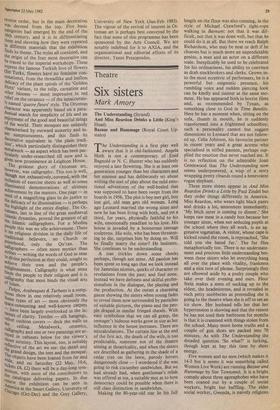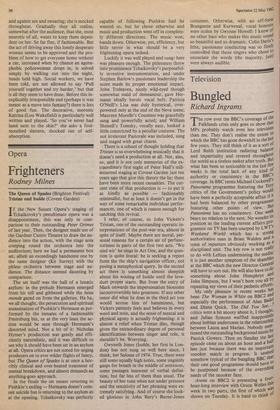Theatre
Six sisters
Mark Amory
The Understanding (Strand) And Miss Reardon Drinks a Little (King's Head) Bazaar and Rummage (Royal Court Up- stairs)
The Understanding is a first play well aware that it is old-fashioned. Angela Huth is not a contemporary of Enid Bagnold or N. C. Hunter who has suddenly enjoyed a late flowering. She is at least one generation younger than her characters and her manner and has deliberately set about writing the sort of play about the mild emo- tional adventures of the well-heeled that was supposed to have been swept from the boards in 1956. The plot is boy met girl, boy lost girl, old man gets old woman. Long ago Leonard married the wrong sister and now he has been living with both, and yet a third, for years, physically faithful to his wife, emotionally steadfast to his love. His house is invaded by a boisterous teenage sculptress. His wife, who has been threaten- ing to die, surprises him by doing so. Will he finally marry the sister? He hesitates. She continues to be understanding.
A tear trickles down some cheeks perhaps, though not mine. All passion has been spent so long ago that we look instead for Jamesian niceties, quirks of character or revelations from the past; and find none. Instead we have deftness and skilful profes- sionalism in the dialogue, the playing and the production. At the outset a charming gauze showing the sisters when young fades to reveal them now surrounded by pastiches of suitable pictures, the piano and the peo- ple draped in similar fringed shawls. With easy symbolism that we can all grasp, the teenager's hideous works grow in size as her influence in the house increases. There are miscalculations. The curtain line at the end of the first act, the death of the wife, is too predictable, someone not of the theatre aiming at theatricality, and when the sisters are described as gathering in the shade of a cedar tree on the lawn, parody hovers dangerously close — I wondered if she was going to risk cucumber sandwiches. But we had already had, when gentleman's relish was offered at tea, a suitable mot as to how democracy could be possible when there is still class distinction in sandwiches.
Making the 80-year-old star lie his full
length on the floor was also cunning, in the style of Michael Crawford's tight-rope walking in Barnum: not that it was dif- ficult, not that it was done well, but that he could do it at all. But there we reach Ralph Richardson, who may be neat or deft if he chooses but is much more an unpredictable genius, a man and an actor on a different scale. Inexplicably he used to be celebrated for his ordinariness, his ability to convince as drab stockbrokers and clerks. Grown in- to the most eccentric of performers, he is a powerful but enigmatic presence, his rumbling voice and sudden piercing look can be kindly and sinister at the same mo- ment. He has appeared both in horror films and, as recommended by Tynan, as something close to God in Time Bandits. Here he has a moment when, sitting on the sofa, thumb in mouth, he is suddenly transformed into a frightened schoolboy; such a personality cannot but suggest dimensions to Leonard that are not follow- ed up. Celia Johnson, his favourite partner in recent years and a great actress who specialised in stifled passion, perhaps sup- plied the emotion that never reached me. It is no reflection on the admirable Joan Greenwood that The Understanding now seems underpowered, a wisp of a story wrapping pretty ribands round a benevolent rogue elephant.
Three more sisters appear in And Miss Reardon Drinks a Little by Paul Zindel but they order things differently in America. Miss Reardon, who wears tight black pants and drinks a lot, announces immediately, `My bitch sister is coming to dinner.' She keeps raw meat in a candy box because her younger sister, when not seducing pupils at the school where they all work, is an ag- gressive vegetarian. A visitor, whose cape is kicked round the room, is reproached, 'She told you she hated fur.' The fur flies metaphorically too. There is no understate- ment and precious little understanding bet- ween these sisters who let everything hang all over the place with vitality, frankness and a nice turn of phrase. Surprisingly they are elbowed aside by a pushy couple who take over their evening and ours. Fleur Stein makes a mess of sucking up to the eldest, the headmistress, and is revealed in such petty snobberies as pretending she is going to the theatre when she is off to see an ice show. Her husband tells her that her hypertension is showing and that the reason he has not used their bathroom for months is that it is crammed with things stolen from the school. Many more home truths and a couple of gun shots are packed into 70 minutes. As with The Understanding the dreaded question `So what?' is lurking, though kept at bay this time by sheer energy.
Five women and no men (which makes it 14-3 but it seems it was something called Women Live Week) are running Bazaar and Rummage by Sue Townsend. It is a bright comedy about three agoraphobes who have been coaxed out by a couple of social workers, bright but baffling. The elder social worker, Gwenda, is naively religious
and against sex and swearing; she is mocked throughout. Gradually they all realise, somewhat after the audience, that she, most neurotic of alt, wants to keep them depen- dent on her. So far fine, if fashionable. But the act of driving away this lonely desperate woman seems to be approved and the pro- blem of how to get everyone home without a car, increased when by chance an agora- phobic policewoman drops in, is solved simply by walking out into the night, heads held high. Social workers, we have been told, are not allowed to say 'Pull yourself together and try harder,' but that is all they seem to have done. Before this in- explicably irresponsible end (perhaps it was meant as a move into fantasy?) there is lots of good fun. The decorative, moronic Katrina (Lou Wakefield) is particularly well written and played. 'So you've never had lame next to the skin?' she asks a foul- mouthed slattern, shocked out of self- absorption.







































 Previous page
Previous page